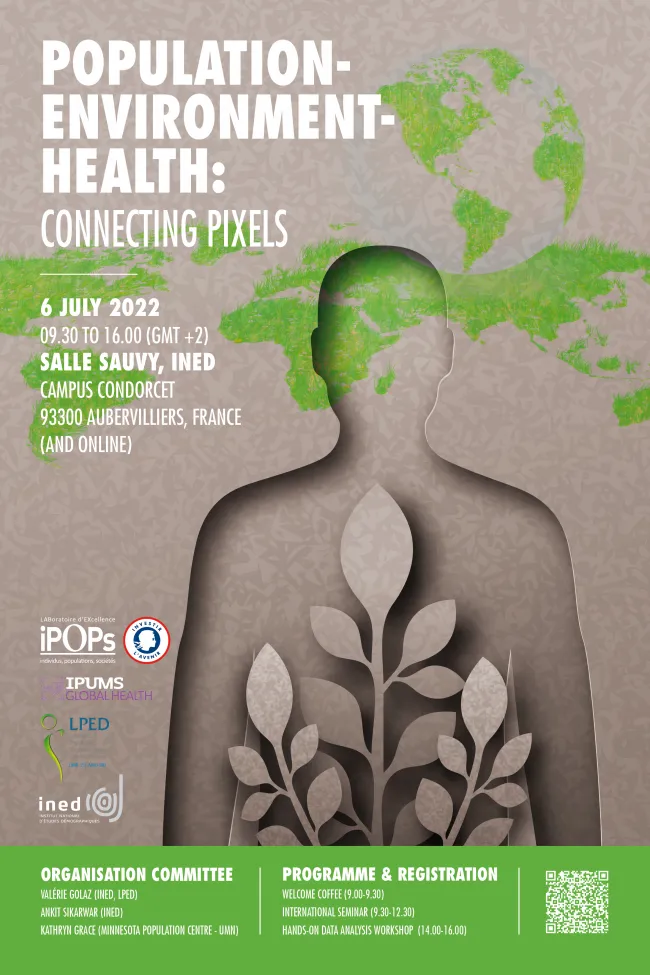Population-Environment-Health : Connecting Pixels
Population-environment-health: connecting pixels
Mercredi le 6 juillet à l'Ined (salle Sauvy) et par vidéoconférence
Growing research on the nexus of Population-Environment-Health is developing alongside the accessibility of a wealth of data: demographic and health data stemming from population censuses, surveys and administrative records, and spatial data derived from more and more frequent and finely resolved satellite images. But how these data are analysed together, when they are of different nature and have different spatial and temporal scales? This event brings together a seminar with exclusive talks on these questions and a hands-on training to link health and climate data.
PROGRAMME
9.00: Welcome coffee/tea
9.30 – 9.45: INTRODUCTION
• Reconciling demographic, health and spatial data
‑ Valerie Golaz, Ined, LPED (France)
‑ Ankit Sikarwar, Ined (France)
- Kathryn Grace, Minnesota Population Center – UMN (USA)
9.45 – 10.45: SESSION 1 (Chair: Valérie Golaz, Ined-LPED)
POPULATION, ENVIRONMENT AND HEALTH: A GLOBAL PERSPECTIVE
• Population and Environment: where do we stand?
‑ Jacques Véron, Ined (France)Présentation
• Linking climate change and women’s health using health survey data
‑ Kathryn Grace, Minnesota Population Center – UMN (USA)
Coffee break
11.00 – 12.30: SESSION 2 (Chair: Emilie Counil, Ined)
CASE STUDIES LINKING ENVIRONMENTAL AND DEMOGRAPHIC DATA
• Conceptual and methodological challenges in understanding patterns of (im)mobilities in a changing climate. Insights from Ethiopia
‑ Marion Borderon, Vienna University (Austria)Présentation
• Matching environmental data produced from remotely sensed images with demographic data in Sub-Saharan Africa
Basile Rousse, University of Paris, LIPADE, Ined (France)
• Role of remotely sensed data in estimating SDG indicators at smaller spatial scales: A case study on Indian peri-urban villages
‑ Ankit Sikarwar, Ined (France)Présentation
Lunch break
14.00 – 16.00: HANDS-ON DATA ANALYSIS WORKSHOP
• Linking health survey data with different climate datasets in R
‑ Devon Kristiansen and Matt Gunther, IPUMS (USA)
This workshop is co-hosted by IPUMS, the leading provider of census and survey data from around the world. Workshop trainers will discuss their work with the global reproductive health data series, Performance Monitoring for Action (PMA). You will have the opportunity to practice connecting PMA data
– a spatially detailed individual-level health survey data set – with remotely sensed rainfall and temperature data (CHIRPS and CHIRTS form UCSB’s Climate Hazard’s Center) to explore how women’s family planning decisions are impacted by environmental variability. All featured data and analysis software (R) are free and publicly available.To participate in the hands-on training, participants should have basic knowledge of demographic data and use of R-software.
Pour en savoir plus sur IPUMS-PMA : https://pma.ipums.org
Tous les documents de cette formation se trouvent sur : https://pma.ipums.org/pma/tutorials.shtml

